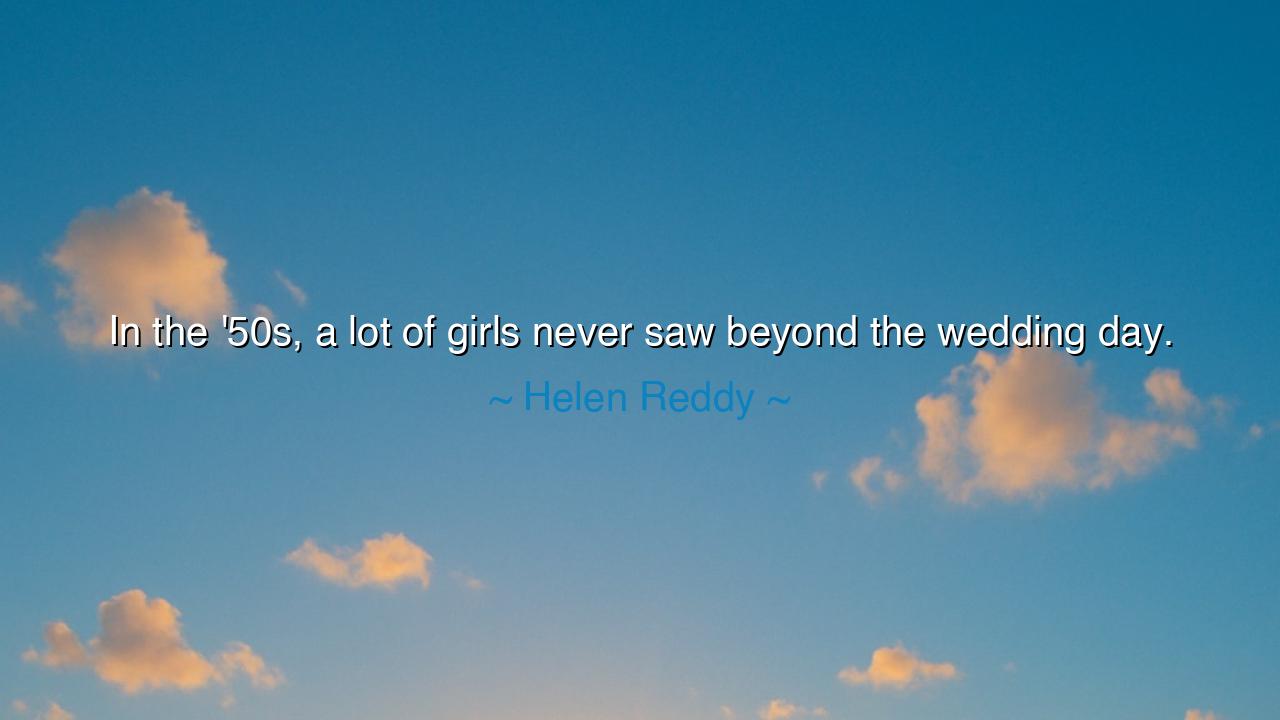
In the '50s, a lot of girls never saw beyond the wedding day.






The words of Helen Reddy—“In the '50s, a lot of girls never saw beyond the wedding day.”—are both lament and revelation. They unveil a truth about a time when marriage was not only celebrated as the pinnacle of life, but often seen as the sole destiny of women. The wedding day, adorned with lace and promise, became the horizon of their dreams, beyond which few were encouraged to look. To many, it was not the beginning of a journey, but the culmination of their worth.
This utterance speaks to the narrow roles imposed upon women in that age. In the 1950s, across much of the world, especially in the West, women were taught that their highest calling was to be wives and mothers. Ambition beyond the home—whether in art, science, or politics—was often discouraged or outright forbidden. Thus, their imaginations, full of potential, were funneled toward a single day: the wedding, the moment society told them their story reached its climax.
History offers us the lives of many unsung women, whose brilliance was dimmed by these cultural expectations. Yet there are also figures like Rosalind Franklin, the scientist whose work was essential to discovering the structure of DNA. Living in the 1950s, she defied the pattern of women who “saw only the wedding day,” choosing instead to see beyond—to knowledge, to discovery, to a legacy that would endure far longer than ceremony. Her life stands as proof that the path of possibility stretched further than what society allowed women to see.
The quote also calls us to reflect on the evolution of freedom. To see beyond the wedding day is to see a future not bound by tradition alone, but open to choice, growth, and independence. It does not diminish the sacredness of marriage, but reminds us that life is not contained within it. Love and union may be chapters, but they are not the entire book. Reddy’s voice, strong and resolute, carries the weight of her era’s awakening, when women began to claim their right to imagine futures of their own making.
Let this wisdom endure: never let your dreams end at a single day, no matter how radiant. The wedding day may be a milestone, but it is not the horizon of your life. Look beyond, to the vast fields of possibility, for the world is wide and the soul was not born to be contained. As Helen Reddy teaches, true vision lies not in stopping at society’s endpoint, but in stepping beyond it, and writing a destiny larger than tradition alone.






TPKim Trang Phi
This comment makes me think about generational progress and how cultural conditioning shapes dreams. Back in the 1950s, marriage was seen as the pinnacle of a woman’s life, but was that because of love or because of lack of options? I’m curious how many women felt trapped versus how many genuinely found happiness in that role. Do we romanticize that era too much without acknowledging the quiet frustrations behind it?
CSTran Cong Son
I find this quote powerful because it reflects a time when women’s ambitions were socially restricted. It raises questions about how much autonomy women truly had in shaping their futures. Were they even encouraged to imagine a life beyond domestic roles? Today, while more opportunities exist, do you think society still subtly conditions people — especially women — to prioritize relationships or appearances over personal growth and independence?
BNMinh Anh Bui Ngoc
Helen Reddy’s observation feels both nostalgic and sobering. It reminds me how narrow the definition of success was for women in the mid-20th century. I can’t help but wonder — how many dreams were suppressed because of the belief that marriage was the only path to fulfillment? It’s inspiring to think about how far we’ve come, but also concerning how modern culture sometimes still glamorizes marriage as an endpoint rather than a beginning.
Kkhang
This statement really captures how limited women’s aspirations were during that era. It makes me wonder — was it purely societal pressure that led so many girls to focus only on marriage, or did they genuinely believe that was the ultimate goal? It’s both sad and fascinating to think about how cultural expectations shaped women’s identities back then. Do you think things have truly changed, or do similar pressures still exist today in subtler ways?